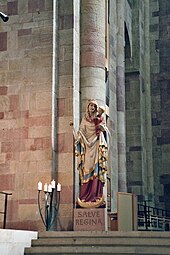Salve Regina

The Salve Regina is the Marian antiphon , in the Liturgy of the Hours of the Catholic Church in the time of Ordinary either after Vespers or after Compline is sung - depending on which of these two Horen is the last one that is celebrated in community. In many regions it is customary to sing the Salve Regina at the burial of a priest or consecrated person at the grave.
Name and text
For the Salve Regina - as for the other Marian antiphons - the term "antiphon" has become established, although it is not an antiphonal but rather a hymn-like chant without reference to a psalm . The antiphon is named after the first two words of the Latin text that was written before 1054 and Hermann von Reichenau (Hermann the Lahme, Hermannus Contractus), a Benedictine of the Reichenau Abbey , but also Petrus von Monsoro or Compostela , Ademar von Le Puy- en-Velay and Bernhard von Clairvaux . The text consists of lines of verse in free rhythms in the style of the Psalms, the New Testament Cantica and early Christian poetry (e.g. Gloria , Te Deum ).
The earliest handwritten text transmission can be found in the Pontifical of Aurillac (Paris, addendum around 1100). The last invocations of the prayer ("O clemens, o pia, o dulcis Virgo Maria") are a later addition that St. Bernard of Clairvaux is said to have added. In the first line, the word mater 'mother' is an insertion that did not gain acceptance until the 16th century; until then the song was addressed to Regina misercordiae , the "Queen of Mercy".
text
| Latin | German |
|---|---|
|
Salve, Regina, |
Greetings, O Queen, |
Melodies of the Salve Regina
The Gregorian way of singing the Salve Regina is in a festive version in Liber Usualis ( in tono solemni ). The melody most sung in monasteries and parishes in a “simple tone” ( in cantu simplici ) goes back to the Belgian baroque composer Henri Du Mont (1610–1684) and is the version printed in God's Praise No. 666, 4.
The initial motif of the simple version - the major triad with the sixth - is also a frequent chime disposition , often called Salve-Regina chime .
Beginning of the melody after Henri Du Mont:
A German transmission with a melody by Heinrich Rohr was printed in the Gotteslob of 1975 under number 571, as was the song paraphrase “Salve! Maria Königin ”based on a melody from the Rheinfelsische hymnal from 1666 under the number 572.
"Hail, Queen" (Salve-Regina-Lied)
To Johann Georg silk Busch (1641-1729), a Marian hymn goes back, the St. Mary's title in the individual stanzas Salve Regina paraphrased. It is included in the praise of God under number 536 (GL old 573).
1 Hail, Queen, (oh Maria) - exalted woman and ruler, (oh Maria).
2 O Mother of Mercy, - the sweetness of our lives.
3 Greetings to you, our hope, - who are the refuge of sinners.
4 We children of Eve cry to you - we cry out of death and misery.
5 O mighty advocate, - with God be our helper.
6 Turn your gentle eye on us - and show us Jesus after the end.
The refrain reads: "Rejoice, you Kerubim, sing praises, you Seraphim, greet your queen: Salve, salve, salve Regina!"
New versions after the Reformation
The Reformers rejected the veneration of Mary, but the Latin Liturgy of the Hours was initially continued and there were Latin chants in the service. So the passages in the Salve Regina , in which Mary was mentioned, were rewritten in relation to God the Father and Jesus Christ . Instead of Salve Regina, mater misericordiae , it was now “Christian bettered” Salve o Christe, salve, fons misericordiae (“Greetings, Christ, you source of mercy”), Laetemur in Christo (“We want to rejoice in Christ”), Salve Rex aeternae misericordiae (“Greetings, King of Eternal Mercy”, Erfurt 1525) or similar. Michael Praetorius set Salve Rex noster [Salve Regina, Christianly improved] to music in 1611 with the following new versions addressed to God the Father:
- Salve Rex noster, salve, pater misericordiae (instead of: Salve, Regina, mater misericordiae )
- Eia, ergo advocate noster (instead of: advocata )
- Et Jesum, unigenitum filium tuum nobis […] ostende (instead of: Et Jesum, benedictum fructum ventris tui nobis […] ostende ).
- o dulcis Rex noster, salve (instead of: o dulcis virgo Maria ).
During the Enlightenment in 1785, Christian Adolph Overbeck published a version of Pergolesi's Salve Regina with a German parody : Heil dir! Death you finisher! You consolation of suffering! You wish of the Christian!
The Salve Regina in music history (selection)
Throughout the centuries of occidental music history, many composers set the Salve Regina to music. B .:
- Johannes Ockeghem (approx. 1410–1497): Salve Regina (motet)
- Pierre de la Rue (* around 1460–1518): Salve Regina I - VI (motets)
- Claudio Monteverdi (1567–1643): Psalmi e Framenti: Salve o Regina a voce solo e Bc and Salve Regina a voce sola, Selva morale e spirituale : Salve Regina con dentro un Ecco voce sola risposta d'ecco et due Violini, Salve Regina a 2 voci, due Tenori o due Soprani, Salve Regina a 3 voci, Alto, Basso, et Tenore o Soprani
- Jean-Baptiste Lully (1632-1687)
- Giovanni Battista Bassani (1657-1712)
- Alessandro Scarlatti (1660-1725)
- Valentin Rathgeber (1682–1750): Salve Regina , motet for choir and solos ( SATB ), violins and basso continuo
- Georg Friedrich Händel (1685–1759): Sacred concert for soprano, strings and organ / harpsichord HWV 241
- Johann Adolf Hasse (1699–1781)
- Giovanni Battista Pergolesi (1710-1736)
- Joseph Haydn (1732–1809): Salve Regina in G minor for four-part choir, strings and concert organ, Hob.XXIII / b: 2 (1771)
- Antonio Salieri (1750–1825): Salve Regina in D major (1815), with German text in G major and finally in B major for four-part choir and orchestra
- Cayetano Carreño (1774–1836): Salve Regina (1814)
- Ferdinand Schubert (1794–1859): Salve Regina , op.12
- Franz Schubert (1797–1828): Salve Regina op.140 in C major for mixed quartet (April 1824) and Salve Regina op.153 in A major for soprano and orchestra (November 1817)
- Moritz Hauptmann (1792–1868): Salve Regina
- Otto Nicolai (1810–1849): Salve Regina (Hymn to the Holy Virgin) op. 39 (1846)
- Franz Liszt (1811–1886): Salve Regina , p. 66 (1885)
- Gabriel Fauré (1845–1924): Salve Regina , op. 67/1 (1895)
- Leoš Janáček (1854–1928): Prayer of Jenufa in the 2nd act of the opera of the same name
- Francis Poulenc (1899–1963): Finale of the opera "Dialogues des Carmélites" (1957)
- Georg Trexler (1903–1979): Salve Regina (1954)
- Hermann Schroeder (1904–1984): Salve Regina , in Die Marianischen Antiphonen for organ (1953), and "Salve Regina", Cantilena choralis for violoncello and organ (1981)
- Jean Langlais (1907–1991): Missa Salve Regina , 3 voix égales, unisson, 2 orgues, 5 trombones, 3 trompettes (1954)
- Anton Dawidowicz (1910–1993): Salve Regina
- Arvo Pärt (* 1935): Salve Regina (2002)
- Guy Bovet (* 1942): Salve Regina for organ (1978)
- Andrew Lloyd Webber (* 1948): in the musical " Evita " (1974) under the title "Requiem"
- Enjott Schneider (* 1950): 2nd symphony, 1st movement
- Olivier Latry (* 1962): Salve Regina (Latry) (2007)
- Yves Castagnet (* 1964): Mass "Salve Regina"
Edition
- Analecta Hymnica Medii Aevi , ed. Guido M. Dreves et al., Vol. 50, pp. 318 f.
literature
- Johannes Maier: Studies on the history of the Marienantiphon "Salve regina". Pustet, Regensburg 1939 (Philosophical dissertation from March 25, 1939, Freiburg i. B.)
- Walter Berschin : Eremus and Insula. St. Gallen and Reichenau in the Middle Ages - a model of a Latin literary landscape. Ludwig Reichert Verlag, Wiesbaden 1987, ISBN 3-88226-383-8 , p. 16 f .; different in the 2nd, expanded edition 2005, ISBN 3-89500-433-2 .
- Walter Berschin, Martin Hellmann: Hermann the Lame - scholar and poet (1013-1054) (= Reichenauer texts and pictures 11). Mattes, Heidelberg 2004, ISBN 3-930978-67-9 , pp. 96-103.
Web links
Individual evidence
- ↑ On the author's question cf. Walter Berschin, Martin Hellmann: Hermann the Lame - scholar and poet (1013-1054). Heidelberg 2004, p. 96-103 with reference (ibid. P. 101) to allusions to the text by Salve Regina from the temporal and spatial vicinity of Hermann the Lame, the former Reichenau manuscript from the second half of the 11th century. Karlsruhe, Badische Landesbibl. Aug. LV, fol. 42v.
- ↑ Cf. Walter Berschin, Martin Hellmann : Hermann the Lahme - Scholar and Poet (1013-1054). Heidelberg 2004, p. 97.
- ↑ Paris, BnF lat. 944, fol. 145r, addendum around 1100; see. Page Latin 944 of the BnF ; Walter Berschin, Martin Hellmann : Hermann the Lame - scholar and poet (1013-1054). Heidelberg 2004, note 43, p. 105.
- ^ Hermann Kurzke , Christiane Schäfer: Mythos Maria. Famous Marienlieder and their history. Munich 2014, p. 93.
- ↑ With "misery" is not meant here miseria (in the sense of unhappiness), but it comes from the Old High German elilente ("foreign", "foreign"). For example, exsules filii Evae refers to the expulsion from paradise and exile abroad (which, of course, has also become misery in the common sense). The German dictionary of the Brothers Grimm explains on “Elend” (Vol. 3, Sp. 406): “1) The original meaning of this beautiful word, which was entered by homesickness, is living abroad, in the foreign, and the Latin exsul, exsilium, as it were extra solum are close to him. “ ELEND, n.. In: Jacob Grimm , Wilhelm Grimm (Hrsg.): German dictionary . 16 volumes in 32 sub-volumes, 1854–1960. S. Hirzel, Leipzig ( woerterbuchnetz.de ).
- ↑ Liber usualis missae et officii pro dominicis et festis cum cantu Gregoriano ex editione Vaticana adamussim excerpto a Solesmensibus Monachis. Desclée, Paris / Tournai 1954, p. 276.
- ^ Antiphonale Romano-Seraphicum pro horis diurnis. Desclée, Paris / Tournai 1928, p. 102f. ( In tono solemni ), pp. 103f. ( In tono simplici ).
- ↑ Sankt Anna Ranstadt - Salve Regina; c ', e', g ', a' on YouTube
- ^ Catholic Encyclopedia : Salve Regina.
- ^ Antwerps Collegium Musicum: christuskoning
- ^ Johann Baptist Pergolesi's Salve Regina in piano reductions with a German parody. For the good of the poor institute of the city of Lübeck, Lübeck: In Commission by Christian Gottfried Donatius 1785 ( digitized , British Library )



